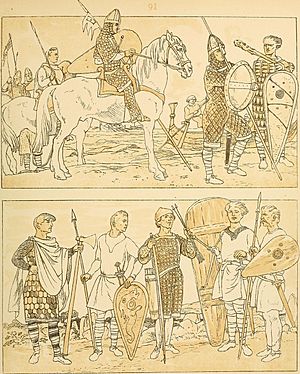Norman yoke facts for kids

The Norman yoke is a term used to describe the harsh rule and unfair system that many English people felt after the Normans took over England in 1066. It refers to the idea that William the Conqueror, the first Norman king of England, and his followers brought a difficult way of life called feudalism to England. This idea became popular in England from the mid-1600s, especially when people talked about English nationalism and democracy.
Contents
What Was the Norman Yoke?
The idea of the Norman yoke suggests that before the Normans arrived, England had a "golden age" under the Anglo-Saxons. People believed that the Normans destroyed this good time. They saw the Norman nobles and landowners as foreign invaders who took away the rights of the English people.
One early writer, Orderic Vitalis, wrote in his book Ecclesiastical History that the Normans put a heavy "yoke" on the English. He said the English "groaned aloud for their lost liberty." However, later in his life, he wrote more positively about King Henry I's rule. He said Henry governed well and gave fair laws to his people.
How the Idea Began
The actual phrase "Norman yoke" first appeared in a book called The Mirror of Justices in 1642. This book was published during the English Civil War. It was a translation of an older French book from the 1200s. Even though the original book was fictional, people in 1642 believed it was true history.
Many critics who believed in the Norman yoke idea looked back to kings like Alfred the Great or Edward the Confessor. They saw these Anglo-Saxon kings as examples of true justice. They also saw the Magna Carta as an attempt to bring back the old English rights that existed before the Normans arrived.
Sir Edward Coke, a famous lawyer, worked to reorganize the English legal system. He argued that English common law was very old and existed even before the Norman Conquest. He didn't use the exact phrase "Norman yoke," but his ideas supported the belief that English rights were ancient.
The Norman Yoke and Social Change
The idea of the Norman yoke was very powerful for the poorer people in England. It suggested that the rich nobles were descendants of foreign invaders. These invaders had taken away the good life of the Anglo-Saxons.
During the long political problems in England and Scotland in the 1600s, this idea became even more radical. While some, like John Pym and Edward Coke, thought the Magna Carta mainly protected the rights of landowners, others took it further.
Groups like the radical Diggers, led by Gerrard Winstanley, used the Norman yoke idea to demand big changes. They wanted to end primogeniture (where the oldest son inherits everything). They also wanted land to be farmed in common by everyone. Winstanley wrote in 1649 that by defeating King Charles, whom he called "our Norman oppressor," they had "recovered ourselves from under his Norman yoake."
Later Interest in the Idea
Interest in the Norman yoke idea grew again in the 1700s. It appeared in books like Historical Essay on the English Constitution (1771). It was also part of debates between important thinkers like Thomas Paine and Edmund Burke. Even Thomas Jefferson in America supported this idea.
By the 1800s, the Norman yoke was no longer a major political issue. However, it remained popular in history books and stories. It helped create a romantic image of an Anglo-Saxon "golden age" in England. For example, Sir Walter Scott's novel Ivanhoe (1819) helped make this idea popular.
Norman Yoke and Religion
Some Protestants in the Victorian era (1800s) connected the Norman yoke to anti-Catholicism. They claimed that the English Anglo-Saxon Church was more independent from the Pope than the Norman Church. They pointed to events like Pope Alexander II supporting William the Conqueror. This link between English nationalism and anti-Catholicism influenced books like Charles Kingsley's novel Hereward the Wake (1866). Like Ivanhoe, this book helped popularize the image of a romantic Anglo-Saxon England destroyed by the Normans.
However, not everyone agreed. Thomas Carlyle, a famous writer, thought the Norman Conquest was actually good for England. He believed it helped unify the country.
In recent times, historian Michael Wood has discussed the Norman Yoke concept. He talked about it in the BBC History series In Search of England, showing how it's become a highly mythologized part of history.
See also
 | Emma Amos |
 | Edward Mitchell Bannister |
 | Larry D. Alexander |
 | Ernie Barnes |

